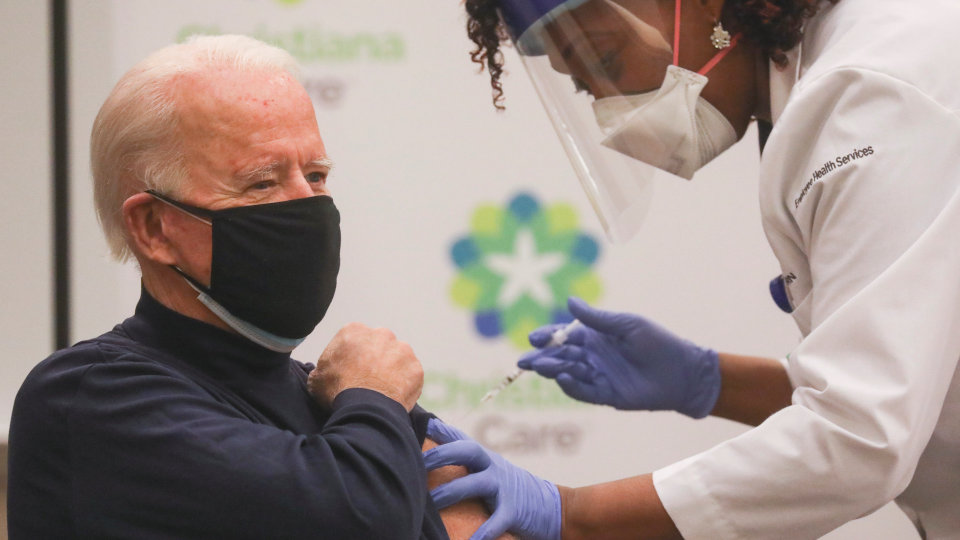By Glynn Wilson –
After a year of federal confusion over the coronavirus pandemic and 500,000 deaths in the United States in large part because of the lack of a plan by the Trump administration, it’s only taken the Biden administration a month in office to come up with a national website to help Americans find out where to get access to a vaccine.
The Centers for Disease Control and Prevention — which was hamstrung by the Trump administration and treated like a red-headed step child — is now backing a centralized portal where the public can search for nearby vaccination locations with doses on hand in hopes of making it easier for Americans to find Covid-19 vaccines.
The website VaccineFinder, now run by Boston Children’s Hospital with the help of a number of collaborators, grew out of the H1N1 flu pandemic of 2009 and has been used for years to coordinate the distribution of flu and childhood vaccines. It was expanded on Wednesday to include the availability of coronavirus vaccines at more than 20,000 test locations concentrated in a few states.
The website’s developers plan to expand it nationwide in coming weeks to include nearly all vaccine providers that agree to be featured, making the website far more comprehensive than anything that exists now.
“We’re trying to create a trusted site and bring some order to all this chaos and confusion around availability,†said John Brownstein, a Boston Children’s Hospital researcher who runs the site.
The project is not a panacea, he said, since it will not enable people to book appointments. It simply directs people to other portals where they can try to register to get vaccinated.
Nor does the website address the key constraints — most notably the limited supply of vaccine doses — that are preventing more people from getting shots quickly.
“It’s not a tool that’s going to necessarily make things easier for people to get the vaccine,†said Claire Hannan, executive director of the Association of Immunization Managers. “They’re going to see where vaccine is, but they’re still going to have challenges trying to get an appointment.â€
After a rocky start, according to The New York Times, the vaccination campaign in the United States has accelerated in recent weeks, with 17 percent of adults in the U.S. receiving a first dose, and 7.6 percent now fully vaccinated, according to the C.D.C.
That puts the government well on the way to fulfilling President Biden’s promise that at least 100 million vaccine doses would be administered in the United States by his 100th day in office, a goal he has since raised to 150 million doses.
Getting appointments for vaccinations has been a source of frustration for people all over the country, scrambling to deal with a deregulated system much like the power grid in Texas. It’s seems like every man or woman for themselves, staying on the phone for hours and trying to make and meet appointments at health departments or clinics in local areas.
Appointment slots have been snapped up as soon as they become available, as state and local health departments and pharmacy chains competed for customers and often not sharing data with one another.
The C.D.C. has its own Vaccine Administration Management System (VAMS), which some states are using to have people register for vaccinations and to collect essential data. State officials have complained, calling it “clunky.”
Exasperated people around the country have taken matters into their own hands, creating online navigator tools and “vaccine hunter†Facebook groups in cities like Los Angeles and New Orleans to help connect people with available doses.
The VaccineFinder portal includes state and local health departments and clinics, as well as some drugstores and grocery store chains nationwide, along with vaccination sites in Alaska, Indiana, Iowa — and it’s already working in Tennessee.
Kristen Nordlund, a spokeswoman for the C.D.C., said the agency was encouraging vaccination locations to “provide accurate and up-to-date information on location, hours and availability of vaccines, so Americans can find vaccine sites easier.â€
Finding vaccine was relatively straightforward in the first weeks of the rollout, when eligible people — health care workers and residents and staff at long-term care facilities — were getting vaccinated mainly where they lived or worked.
“I think people are optimistic and eagerly awaiting it,†said Dr. Marcus Plescia, chief medical officer of the Association of State and Territorial Health Officials. “As with anything that we roll out in the middle of this pandemic, if there are glitches it could end up creating a lot of confusion, but I think we’ll just have to work through it.â€
States are gradually expanding eligibility criteria from people over 75 to 70 and then 65, along with those suffering medical conditions as well as front line workers. More locations have also been added to administer vaccines, including stadiums and local pharmacies.
The federal government under Trump administration control did not create a centralized sign-up system for the vaccine rollout, letting states compete to obtain vaccine and set up their own systems. In that void, counties, local health departments, pharmacy chains and other vaccine providers started their own appointment-booking websites, in some cases adapting systems they already had and in others buying new tools from vendors.
These systems are often not synchronized to share information like which people have registered on their websites. That has frustrated state and local health officials, who cannot cross off their lists people who have secured an appointment at a different location after registering on multiple systems.
“It’s harder to track vaccination appointments and offer them to people who need it most when the systems are so disjointed,†said Blaire Bryant, associate legislative director for health for the National Association of Counties.
Federal and state lawmakers have been clamoring for more centralized registration systems. Representative Anthony Brown, Democrat of Maryland, last week introduced legislation that would create a nationwide sign-up system where the public can register to get vaccinated.
More states have begun registration websites in recent weeks, but those systems typically don’t let people reserve a vaccine or an appointment directly. Instead, they help people navigate existing systems or sign up to get notified when they can schedule an appointment.
The VaccineFinder website is meant to complement, not replace, those efforts, said Dr. Brownstein, who is also the chief innovation officer at Boston Children’s Hospital.
Google started the earliest version of what became the VaccineFinder website. In 2012 Dr. Brownstein and his team took it over. Since then they have been working with state and local officials to identify locations that offer routine vaccinations. The project has received federal funding of about $1 million annually to maintain the website, first from the Department of Health and Human Services and since 2017 directly from the C.D.C. The U.S. government has provided more than $8 million to help the website expand for Covid-19 vaccines.
The VaccineFinder allows people to enter their ZIP code, the distance they’re willing to travel and which of the authorized vaccines they are seeking.
That information generates a map dotted with nearby vaccination locations, with links to appointment-booking websites set up by states, local health departments and pharmacy chains. Vaccine providers can opt out of being highlighted on VaccineFinder. For example, a provider might opt out if it is only vaccinating a certain slice of the population like health care workers.
The website will show which places have doses available, based on data that vaccine locations are supposed to report daily. The need to report that information daily “could be a big lift and lead to varying degrees of accuracy in the system,†said Adriane Casalotti, chief of government and public affairs at the National Association of City and County Health Officials. “As with anything, the value will be in the quality of the data provided.”
Reader Stories
We asked readers on Facebook to tell their stories on getting the vaccine or finding it hard to get lined up for an appointment to get shots. Here are a few of those stories.
John W Lasseter of Indialantic, Florida said there was a notification in early January that Brevard County, Florida was opening up vaccinations for those over 65.
“I started calling at 8 a.m. and kept calling for 2 1/4 hours and my cell phone reported that I connected 197 times. We were lucky and actually got three appointments one day before the end of that planned operation,” he said. “Later that month we got a call to come in the next day (two weeks early).
“The shot was painless. I had no after effects and we have now received our second vaccinations. We were given the Moderna vaccines and our ages range from 66 to 72 to 92. All is well and we are one day from the two week ‘protection’ date.”
Kitty Pate of Gadsden, Alabama, said: “I got both of mine over a month ago, before the shortage. No after effects at all.”
Autumn Yatabe in Birmingham, Alabama, said she has had trouble finding one at all for her boyfriend, musician Ben Trexel, who has a compromised immune system.
“Frustrating,” she said.
Sammye Coin Heald of Athens, Alabama, said she looked everywhere she could think of and couldn’t get an appointment.
“Then my doctor’s office called me telling me they were setting up an appointment for me,” she said. “I got that shot the end of January and I go tomorrow to get my second shot.”
Addi Fergyson in Pittsburgh, Pennsylvania said the local hospital had a clinic a couple weeks ago.
“They had so many anti-vax nurses and staff, on top of dozens of no-shows that there were extra doses at the end of the day,” she said. “The vials would have to be thrown out at 6 p.m. I got there at 5 and was able to get my first shot. I’ll be on ‘stand-by’ for my next dose, but with the first Pfizer vaccine I’ve got 85 percent immunity. If this is all I get, I’m good with that. I’m effin delighted with 85 percent.”
Chelsey Ruth in Mobile, Alabama said she got her first shot at the Mobile Infirmary and was scheduled for the second on Monday.
“They are out of vaccines (now),” she said, “and keep extending the estimated time they will get more.”
Ben Mazzara of Birmingham, Alabama said he signed up at UAB.
“And waiting, and waiting …,” he said.
Kimberly McCuiston in Foley, Alabama said: “The slow unorganized first come first serve roll out in Baldwin County, Alabama is horrible. Lack of vaccines, the lines at OWA and the fact that they are still on 1B is ridiculous. My adult children in the Chicago suburbs have both shots. My sister in New Jersey who is 8 years younger and has no medical conditions got her first Moderna vaccine on Tuesday. Once again Alabama near dead last in anything that requires planning or critical thinking!”














